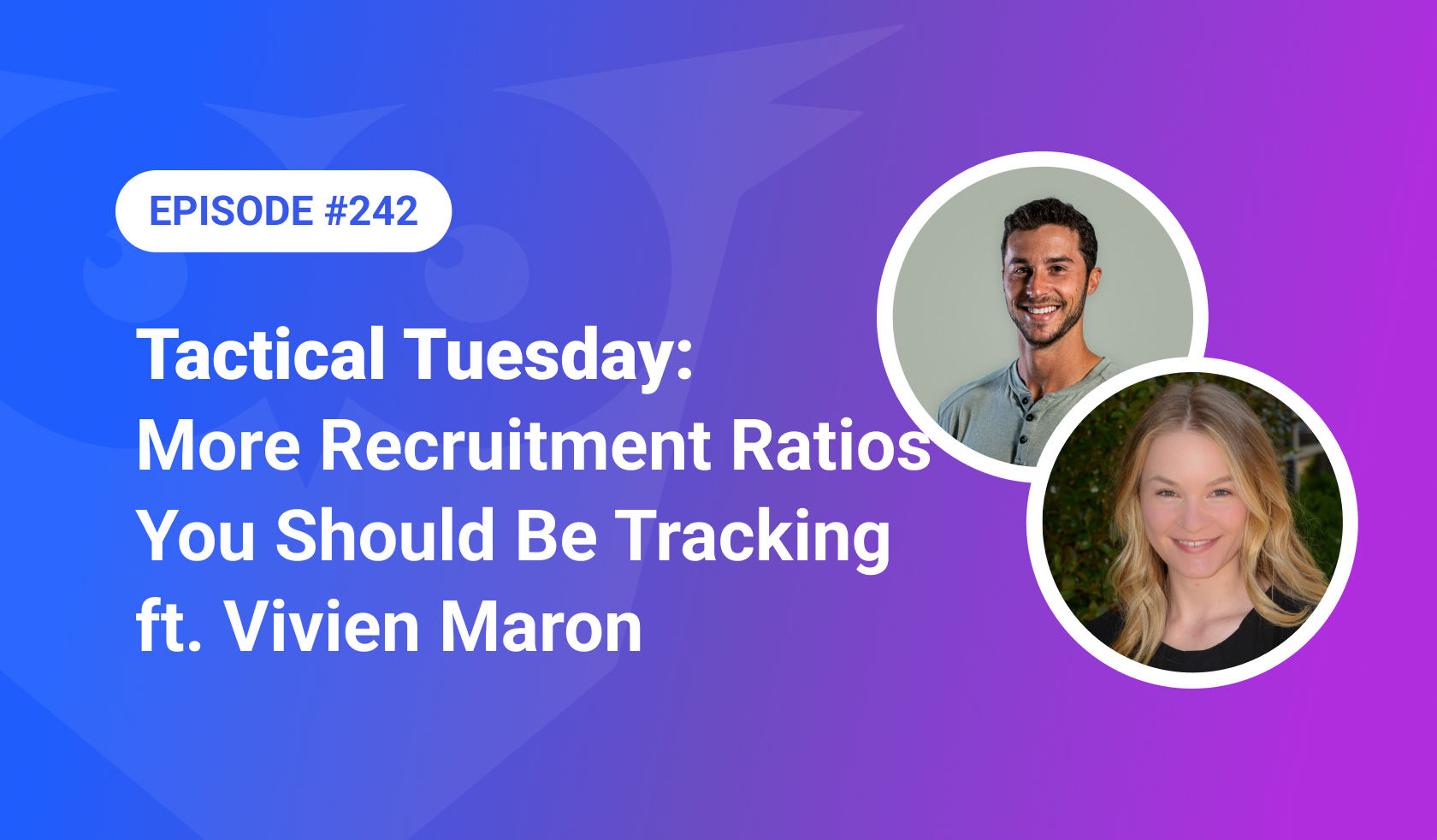Summary:
In this Trending Topics episode, Sam and Lex discuss the pros and cons of a topic that sounds nice in theory, but may not be as practical as many would hope: skills-based hiring.
Throughout the conversation, we explore the reasons behind the shift in hiring practices — ranging from the changing value of college degrees, the impact of labor shortages, and rapidly-changing market conditions. There are so many reasons why skills-based hiring seems like a valid solution to so many problems, but what does it look like for recruiters to implement (and process-ize) this mentality?
This conversation explores the benefits, challenges, and potential solutions related to skills-based hiring — highlighting some of the advantages for both companies and workers and delving into the challenges of operationalizing it. As always, we'll deliver a critical eye, some alternative approaches, and some tactical takeaways — you don't want to miss it!
Chapters:
00:00 - Podcast Intro
02:35 - The Debate Between Education and Skills in Hiring
11:07 - Current Trends in Skills-Based Hiring
19:16 - Encouraging Signals for Skills-Based Hiring
26:30 - Implementing Skills-Based Hiring in Practice
34:26 - Tactics for Implementing Skills-Based Hiring
39:17 - Leveraging Referrals: A Supplementary Approach to
44:20 - Podcast Farewell
A closer look at skills-based hiring in recruitment
In the past few decades, a college degree was often seen as the golden ticket to employment. It was a simple binary filter for employers and recruiters — one that seemingly signaled qualities like persistence, skill, and capability.
However, this trend led to what many now call "degree inflation." Degrees began to lose their value as more and more job postings required them, regardless of whether the skills actually needed for the job were learned in college. Naturally, a whole host of implications and questions follow:
If everyone has a degree, what does a degree really mean? Do we all need to continue to get higher levels of education in order to stand out? Should a degree in a field of study unrelated to the role give a candidate a leg-up over a candidate who doesn't have a degree at at all? And perhaps the biggest question of all: do we need to change the way we evaluate candidates?
What's behind the skills-based hiring movement?
The status quo has been shifting. Shortages in certain industries — coupled with a growing focus on equitable hiring — have led employers to reevaluate their hiring practices. The tight labor market preceding the pandemic forced companies to reconsider the wisdom of filtering out the whopping 62 percent of Americans who lack a degree. This — combined with a desire for broader representation — has fueled the desire for a skills-based mentality in the hiring process. Instead of relying on degrees as a proxy for skills, some forward-thinking companies are wondering how they could evaluate candidates based on their actual abilities and culture-fit.
What can skills-based hiring do?
For companies, skills-based hiring can lead to higher retention rates among non-degreed workers hired into roles that traditionally required degrees. Study after study has shown that investing in upskilling employees not only reduces attrition rates but also saves on external hiring costs.
Employees, on the other hand, experience an average salary increase of 25 percent when hired into roles that previously required degrees. Additionally, they gain access to growth opportunities and internal mobility within the organization.
Sounds great and all...but can skills-based hiring actually work?
Despite the enthusiasm in certain circles for a shift to skills-based hiring, our current reality may be sobering — and raises genuine concerns about whether skills-based hiring is really gaining as much traction as casual observers may have guessed (and whether it should).
According to a study from Harvard Business School, skills-based hiring resulted in increased opportunities for only 1 in 700 hires last year. This represents a new opportunity for approximately 97,000 workers out of 77 million yearly hires.
The problem is this: successful adoption of skills-based hiring in recruitment requires more than just removing degree requirements from job postings. It demands significant changes in hiring practices, which can be challenging for many organizations — especially those that are larger and more well-established (AKA enshrouded in red tape and infrastructure challenges).
It's also difficult to prove skills-based hiring's value to companies who instill it — despite some encouraging signs. The reality is that this is a relatively unproven concept — one that sounds nice in theory (and could be great in practice!) but that has yet to be tested at enough scale to prove its worth.
The most important question remains: how do we operationalize skills-based hiring?
Proponents argue that it fosters organizational agility, a crucial asset in the face of rapidly evolving industries. But there are challenges to consider. Structural reorganization, changes in payment and training methods, and the subjectivity inherent in assessing skills all pose significant obstacles.
Incorporating a skills-based hiring mentality (without changing your entire hiring process)
One thing that's important to consider here: there are ways to incorporate skills-based hiring without undergoing major organizational shifts. In fact, many organizations are probably already using some kind of skills-based mentality when assessing candidates, whether they realize it or not.
Think of it this way: what pushes one candidate over the edge compared to another who has the same on-paper qualifications? How do you measure the skills of a candidate outside of their resume and cover letter?
For those seeking to incorporate skills-based hiring on a small scale, flexible degree requirements, work trials, and referral-based hiring are just a few ideas. By embracing these strategies, companies can begin to reap the benefits of skills-based hiring without completely overhauling their existing systems.
For recruiters, the opportunity exists to challenge the status quo and get creative with the candidates they're bringing to the table — rather than relying exclusively on degrees or certifications, taking a "pattern-matching" approach to the candidates they present.
For example: as more and more teachers leave the field in pursuit of higher pay and more flexibility, how can their transferable skills be applied to roles in other fields? We see a great deal of former teachers thriving in enablement and customer success roles due to the soft skills they've acquired throughout their teaching career.
Wrapping up
Skills-based hiring represents a potentially promising shift in the employment landscape — and a potential major shift in the way recruiters evaluate candidates. The question becomes: who is willing to be the guinea pig who takes the leap and reports back to the rest of us? 😜
More from Becoming a Hiring Machine
Become a hiring machine
Ready to see for yourself how Loxo can transform your recruitment workflow and make you more efficient than ever before? We thought you might be.



